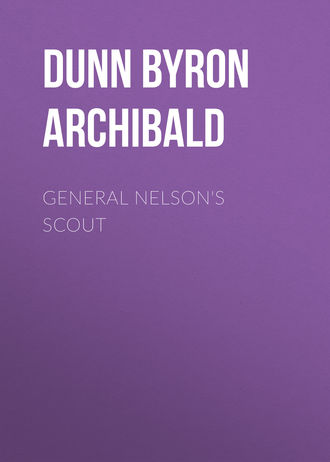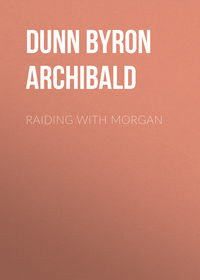 полная версия
полная версияGeneral Nelson's Scout
This answer pleased Nelson immensely. He noticed Hugh more closely, and then suddenly asked: "Have I not seen you somewhere before, my boy?"
"Yes, General," replied Hugh, trembling.
"Where?"
"On the march here, when you tied me by the wrists to a cannon for straggling."
Nelson was slightly taken back by the answer; then an amused look came into his face, and he said, in a bantering tone: "Liked it, didn't you?"
"Liked it! liked it!" exclaimed Hugh, with flaming eyes. "I was just mad enough at you to kill you."
"There is the boy for me," said Nelson, turning to his staff. "He not only captures flags, but he tells his general to his face what he thinks of him." Then addressing Hugh, he continued: "I want a good orderly, and I will detail you for the position."
So Hugh Raymond became an orderly to General Nelson, and learned to love him as much as he once hated him.
Now occurred one of those strange psychological impressions which science has never yet explained. A feeling came to Fred that he must ride over the battlefield. It was as if some unseen hand was pulling him, some power exerted that he could not resist. He mounted his horse and rode away, the course he took leading him to the place where Trabue's Kentucky brigade made its last desperate stand.
Suddenly the prostrate figure of a Confederate officer, apparently dead, attracted Fred's attention. As he looked a great fear clutched at his heart, causing it to stand still. Springing from his horse, he bent over the death-like form; then with a cry of anguish sank on his knees beside it. He had looked into the face of his father.
"Oh! he is dead, he is dead!" he moaned.
Bending down, he placed his ear over his father's heart; a faint fluttering could be heard.
"It beats! he lives! he lives!" he cried, joyously.
With eager eyes he searched for the wound. A ball had shattered Colonel Shackelford's leg, and he was bleeding to death.
For Fred to cut away the clothing from around the wound, and then to take a handkerchief and tightly twist it around the limb above the wound was the work of a moment. The flow of blood was stopped. Tenderly was Colonel Shackelford carried back, his weeping son walking by his side. The surgeon carefully examined the wounded limb, and then brusquely said: "It will have to come off."
"Oh! no, no, not that!" cried Fred, piteously.
"It's that, or his life," shortly answered the surgeon.
"Do it then," hoarsely replied Fred, as he turned away unable to bear the cruel sight.
When Colonel Shackelford came to himself, he was lying in a state-room in a steamboat, and was rapidly gliding down the Tennessee. Fred was sitting by his side, watching every movement, for his father had been hovering between life and death.
"Where am I? What has happened?" Colonel Shackelford faintly asked.
"Dear father," whispered Fred, "you have been very sick. Don't talk," and he gave him a soothing potion.
The colonel took it without a word, and sank into a quiet slumber. The surgeon came in, and looking at him, said: "It is all right, captain; he has passed the worst, and careful nursing will bring him around."
When the surgeon was gone Fred fell on his knees and poured out his soul in gratitude that his father was to live.
When Colonel Shackelford became strong enough to hear the story, Fred told him all; how he found him on the battlefield nearly dead from the loss of blood; how he bound up his wound and saved his life.
"And now, father," he said, "I am taking you home – home where we can be happy once more."
The wounded man closed his eyes and did not speak. Fred sank on his knees beside him.
"Father," he moaned, "father, can you not forgive? Can you not take me to your heart and love me once more?"
The father trembled; then stretching forth his feeble arm, he gently placed his hand on the head of his boy and murmured, "My son! my son!" and they mingled their glad tears together. In the old Kentucky home Fred nursed his father back to health and strength.
But another sad duty remained for Fred to perform. As soon as he felt that he could safely leave his father, he went to Louisville and placed in Mabel Vaughn's hands the little flag, torn by the cruel bullet and crimsoned with the heart's blood of her lover. The color fled from her face, she tottered, and Fred thought she was going to faint, but she recovered herself quickly, and leading him to a seat said gently: "Now tell me all about it."
Fred told her of the dreadful charge; how Marsden, in the very front, among the bravest of the brave, had found a soldier's death; and when he had finished the girl raised her streaming eyes to heaven and thanked God that he had given her such a lover.
Then standing before Fred, her beautiful face rendered still more beautiful by her sorrow, she said:
"Robert is gone, but I still have a work to do. Hereafter I shall do what I can to alleviate the sufferings of those who uphold the country's flag. In memory of this," and she pressed the little blood-stained flag to her lips, "I devote my life to this sacred object."
And binding up her broken heart, she went forth on her mission of love. She cooled the fevered brow, she bound up the broken limb, she whispered words of consolation into the ear of the dying, and wiped the death damp from the marble brow. Her very presence was a benediction, and those whose minds wandered would whisper as she passed that they had seen an angel.
Calhoun Pennington bitterly mourned the death of his chief. He afterward joined his fortune with John H. Morgan, and became one of that famous raider's most daring and trusted officers.
For some weeks Fred remained at home, happy in the company and love of his father. But their peace was rudely disturbed by the raids of Morgan, and then by the invasion of Kentucky by the Confederate armies.
After the untimely death of Nelson, Fred became attached to the staff of General George H. Thomas, and greatly distinguished himself in the numerous campaigns participated in by that famous general. But he never performed more valiant service than when he was known as "General Nelson's Scout."
THE END1
The name of the gallant young man who tore up the track was Crutcher; the author does not know the name of the fireman.



